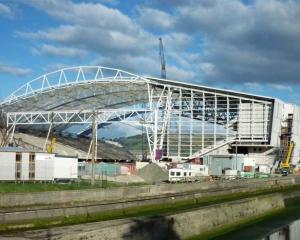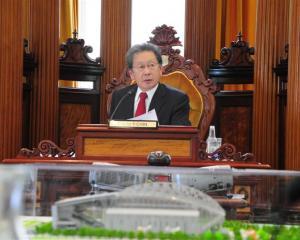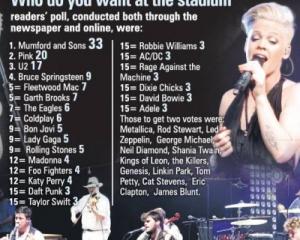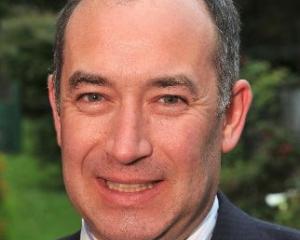Negotiations with rugby interests were drawn out and difficult, Carisbrook Charitable Stadium Trust chairman Malcolm Farry explains in a response to questions raised in a Russell Garbutt letter to the editor (below).
I have tended to avoid responding to letters to the editor of the ODT as I don't believe that is the appropriate forum to debate issues of substance.
However, Russell Garbutt, who has been a vigorous opponent and a regular contributor, has asked some relevant questions in his letter to the editor. I will endeavour to clarify the issues.
The first point relates to the venue hire agreement between the Carisbrook Stadium Charitable Trust (CST), Otago Rugby Football Union (ORFU) and the Highlanders.
At 4.54pm on Thursday, February 5, 2009, the CST signed a venue hire agreement with ORFU and the Highlanders. I can note the time and date so precisely because the Otago Regional Council had given the CST until 5pm that day to secure the agreement or the council's funding offer would be withdrawn.
The negotiations had been a drawn out affair and the CST was forced to take a very tough, uncompromising position.
We required about 3000 seats to sell for corporate suites and lounge membership and we required this at little or no cost. This was a critical component of the private sector fundraising programme.
The ORFU and Highlanders naturally resisted this position, so eventually, we engaged an accounting consultant to consider the position of all parties. He provided recommendations, a model for the future and a compromise as to the costs of the required seats. These proposals were accepted by all parties.
While the new stadium, now known as Forsyth Barr Stadium, was not being built for rugby alone, the income from rugby was considered an integral part of the stadium and its revenue stream, particularly in the early years of operation.
As stated earlier, a legal agreement was signed on February 5, 2009, and Jim Harland, then chief executive of the Dunedin City Council, took over all future discussions and negotiations with the ORFU and Highlanders. This was both a surprise and a disappointment to the CST, as we wished to ensure that the development of a relationship with such key stadium users would continue to evolve in a positive way with the stadium operators.
At that stage, the CST was to be the stadium operator for the first one to two years, to ensure that the plans that supported the project were adopted in a seamless fashion from construction to operation.
The CST is not privy to what happened after the DCC took this matter over, but we and the general public are all aware of the negotiations over the purchase of Carisbrook. If something occurred during these discussions that negated our legal agreement, we have not been advised.
To state that there was no venue hire agreement is totally without foundation, as far as the CST involvement is concerned. The countless hours of discussion and negotiation completed on February 5, 2009, put the lie to that.
The second point raised relates to the private sector funding and the quote that private sector funding was "imprudent, highly risky and, frankly, stupid". Russell Garbutt stated that these were claims made by Mayor Dave Cull. While the mayor may hold these views, the CST certainly does not and they were not the views of council at the time.
Private fundraising was a clearly outlined process from the outset. The DCC set milestones for achievement and would have brought the project to an end if the CST had failed to meet these milestones. That the project continued to completion is an indication of the view of the council.
The private sector fundraising was clearly stated to be based on the sale of membership seats and corporate suites, sponsorship and the sale of naming rights. This programme was first outlined at the first public presentation held at the Southern Cross Hotel on August 11, 2006. The CST has never moved from this position.
Subsequently, the economic environment changed, to add significant difficulty to sales but a remarkable $30 million was raised before handover to DVML in 2009. I believe that this total has now risen to in excess of $40 million. The contractual agreements allowed for some to pay the total amount upfront or to commit to a 10-year term and in some instances allow for a 5-year plus a further 5-year term.
Anyone involved in leasing will acknowledge that two 5-year terms are difficult to secure in the current commercial world and bank loans for commercial activities are provided based on such arrangements. So we were pleased with the result. If the DCC had considered that these contracts were unacceptable, it would have withdrawn support and the project would have ceased.
The CST was confident a facility would be provided that would excite and attract the community, and that it would be operated at such a level that success would be assured and there would be a waiting list for purchase of membership seats and corporate suites. The CST was at that stage to be the early manager and operator of the Forsyth Barr Stadium. The DCC decided, however, that it would establish a new company to do that.
The CST lost the role of operator, so it was never to apply its passion, expertise, local knowledge and commitment to the operation and management of the completed stadium. That role fell instead to the new company DVML and, while we are familiar with some of the staff, who were formerly part of the CST Team, and are confident that they bring a significant passion and skill to their new role, we are no longer privy to management matters.
So, $40 million-plus being raised in the community - about $30 million of it even before the stadium had been given the green light by the DCC - is a remarkable achievement by the people of our city and region. The CST has frequently acknowledged this huge support and does so again and again. It is probably the largest collection of private funds for a public amenity in the lower part of the South Island.
So what is stupid about that? What is imprudent? It is based on very acceptable commercial criteria. What is risky?
If a successful, sought-after product and service is provided, it carries the same risk as any venture. Nothing in life is without risk. But, if you plan properly, commit passionately, provide a superior product and believe in what you are doing, risk is greatly mitigated, no matter what venture you are involved with.
The CST has now completed what it was asked to do by the Dunedin City Council and the Otago Regional Council. Many people love the results, some continue to oppose.
There is no doubt, however, that, after the passage of time, all will eventually unite as one in support for this remarkable addition to our city and region.
• Malcolm Farry is chairman of the Carisbrook Stadium Charitable Trust.
Who is liable for this situation?
Mayor Dave Cull has been quoted as saying "Whether the ORFU went into liquidation or not, DVML was left with a very risky situation, as there were no contracts in place guaranteeing an income stream from professional rugby in our region. DVML had taken on the running of the stadium under the impression that those contracts were in place, underpinning that revenue stream."
He also went on to say that the stadium's private-sector funding arrangements were "imprudent, highly risky and, frankly, ...stupid" and that "there's pretty universal agreement that the ORFU cocked up, and they cocked up on a chronic basis. Pretty reprehensible, really."
Malcolm Farry and the private Carisbrook Stadium Trust, which he heads, sold seating packages and other product which included a component that stated that a certain number of professional rugby matches were to be provided at the new rugby stadium. The numbers of matches are contained within these contracts.
It has now been revealed that, on the other hand, there was no contract signed for the Highlanders to provide those matches. Malcolm Farry also assured the city that there would be a large component of private funding for the stadium and that a number of "lines in the sand" had been met.
The content of the sold contracts are at the core of why the city had entered into a mutual suicide pact with the ORFU.
Several questions arise from this, which Mr Farry, Mayor Cull or CEO Paul Orders may know the answers to.
Who within the CST takes responsibility and accountability for the drawing up and approving of those contracts?
Who within council takes responsibility and accountability for checking those contracts to ensure such a basic flaw didn't occur?
Who takes responsibility and accountability within council for ignoring the very specific warnings from a large number of ratepayers that the whole "private funding" model now described by Mayor Cull as "stupid" was exactly that?
Finally, who takes responsibility and accountability within the DCC and the CST for not knowing that their close business partner, the ORFU, was insolvent and had been living on pokie funds and hope for many years?
• Written by Russell Garbutt






